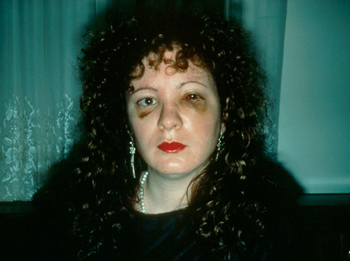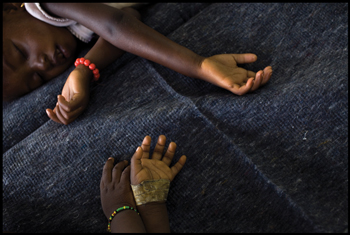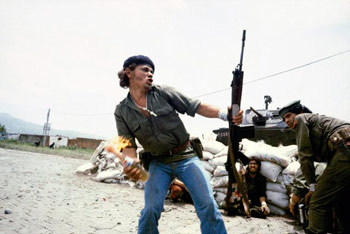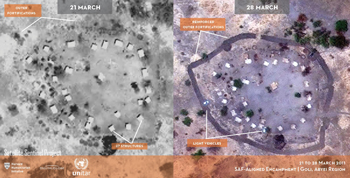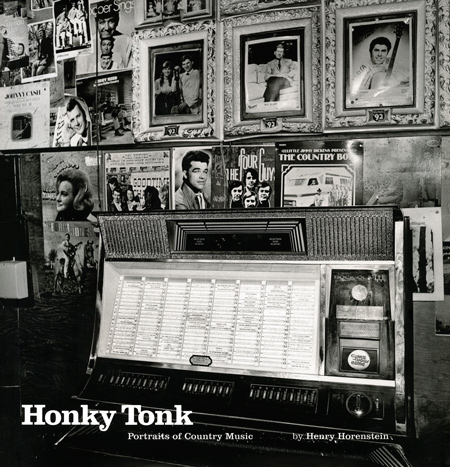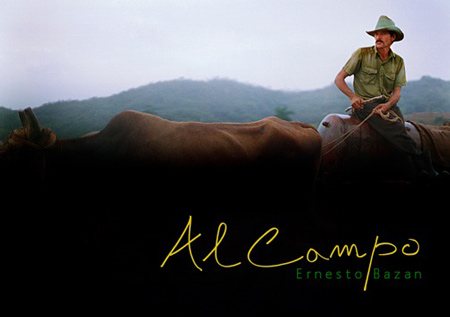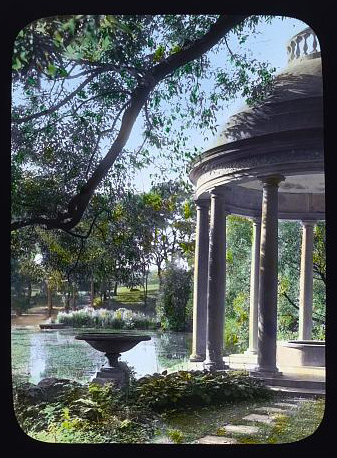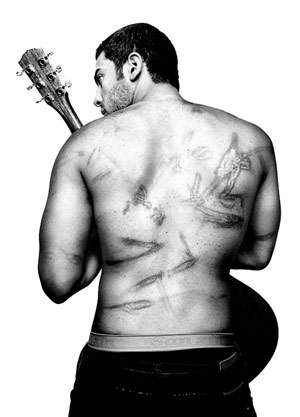Past Programs at the PRC |
|
Archive Master Lecture Series |
2012 Master Lecture Series Vicki Goldberg: American Women Photographers
Vicki Goldberg, one of the leading voices in the field of photography criticism, will discuss how and why American women photographers, most prominently Cindy Sherman and Nan Goldin, came to the attention of the photography world in the late 1970s and early 1980s after lurking on the fringes for a long time. She will also examine the way the principle concerns of that first crop of important women artists, including the entire appropriation movement, have persisted to the present day and continue to influence photographers. "One of photography's most revered and beloved critics, Goldberg examines both the history of photography and our current state of affairs with curiosity, wit, and cutting insight." - Photo Eye Vicki Goldberg has published six books and written introductions to more than twenty monographs and catalogues as well as writing about photography for the New York Times for thirteen years. Her books, The Power of Photography: How Photographs Changed Our Lives and Margaret Bourke-White: A Biography, were each named one of the best books of the year by the American Library Association; the anthology she edited, Photography in Print: Writings from 1816 to the Present, was cited in The Wall Street Journal in 2006 as one of the five best of all books on photography. She has received numerous awards for writing, including the International Center of Photography's Infinity Award, the Royal Society's Dudley Johnston Award, and the Long Chen Cup (China). She lectures internationally and writes on photography for various magazines. Why Global Health Matters Reception immediately following panel in the PRC Gallery, 832 Commonwealth Avenue.
The PRC’s Global Health in Focus project focuses on three of the greatest health challenges the world community faces today: HIV/AIDS, tuberculosis, and access to clean water. This project aims to educate our New England community about these critical global health issues, utilizing documentary photography to offer direct insight into the individuals and communities affected. The panel discussion, along with the exhibition, will lead to a greater understanding of the challenges and possible solutions to global health problems, particularly the work of Boston-based institutions. The overarching goal of “Why Global Health Matters” is to bridge the arts, journalism, and medical communities by analyzing the ongoing universal concerns communicated in the exhibition and publication. By organizing and presenting this project, the PRC serves as a resource not only for photographers but for professionals in the healthcare, human rights, and public policy fields, as well as demonstrating the power of the photographic image. Complimentary copies of the exhibition catalog publication will be given to all attendees at the panel discussion and reception! More about the exhibition >> Jennifer Beard, PhD, MA, MPH Dominic Chavez, featured photographer Since 1991, Chavez has covered a wide range of domestic and international issues. He has reported from the front lines of Iraq and Afghanistan to the war-torn streets of Angola. He has recorded the effects of the ongoing drug war in Colombia, and documented many health issues facing the nations of Africa. Presently, he is focusing on global health issues. Chavez has produced six books: Well Being with Johns Hopkins University, From the Ground Up with the Elizabeth Glaser Pediatric AIDS Foundation, Airborne with the World Health Organization, A Line Drawn in the Sand with Harvard University, Passion Beyond Normal with CGIAR, and AIDS in Nigeria with Harvard University. Chavez received a Kaiser Family Foundation Media Fellowship in 2007–2008 and has been recognized with many awards. In 2004, he won First Place International in Pictures of the Year International for his work during the Iraq War. Also in 2004, Dominic received the Media Excellence Award by the Global Health Council for his work on the AIDS crisis in Africa. In 2000, he was awarded Photographer of the Year from the Boston Press Photographers Association for his work in Afghanistan, Angola, and Colombia. Stefanie Friedhoff (Moderator) Jonathan D. Quick, MD, MPH David Rochkind, featured photographer Rochkind graduated from the University of Michigan with a BA in Sociology and speaks fluent Spanish. Peter Vanderwarker: Applied Creativity
“Making the simple complicated is easy. Making the complicated simple – that’s creativity.” - Charles Mingus Peter Vanderwarker believes that creativity in photography is a learned skill. His professional work relies on “applied creativity” while his personal work relies on a much more difficult form of “personal creativity.” He is his own worst critic, and he recognizes the struggle we all face when we go to make original work. During his lecture, he will discuss several different projects, his personal process, what it’s like to shoot for a client, and steps to enhance your own projects. Peter Vanderwarker spends his professional time making powerful photographs for architects, magazine editors, and corporations. He also does personal work and is represented by Gallery NAGA (Boston, MA). His work can be found in the collections of the Museum of Fine Arts, Boston (MA) and the Addison Gallery of American Art (Andover, MA). View the lecture presentation >> NOTE: For people attending Vanderwarker’s related workshop, attendance at this lecture is required. Click here to read more about his workshop >> Strauch-Mosse Visting Artist Panel Discussion Co-sponsored by The Art Institute of Boston at Lesley University, the Consulate General of France in Boston in collaboration with and Magnum Photos and the Photographic Resource Center
The three photographers are internationally recognized documentary photographers associated with the renowned photo agency Magnum. They will engage in a dialogue about freedom of the press and the current state of contemporary journalism. This panel discussion is being held in conjunction with the 101 Photographs exhibition at The Art Institute of Boston at Lesley. Magnum photographers have donated images for this exhibition in support of the organization Reporters Sans Frontieres and in recognition of the important work of independent journalists and photojournalists who risk safety, comfort, and their lives to bring the news about events around the world. The exhibition includes work by Robert Capa, Henri Cartier-Bresson, David Seymour, and many other renowned photographers. Antoine D'Agata recently photographed the political changes in Libya. His work consists of a mix of art market and photojournalism with a deeply personal approach. His latest works were done for the High Commissioner for Refugees, The United Nations. He has published three books of his work and won the prestigious Niepce Prize for young photographers. He has also created two films: Le Ventre du Monde and Aka Ana. Thomas Dworzak covered many crisis in the world: Chechnya, Karabakh, Abkhazia, Kosovo. He also photographed events in Israel, the war in Macedonia, and the refugee crisis in Pakistan. After 9/11, Dworzak spent several months in Afghanistan. Since then he has photographed in Iraq, Iran and Haiti, and covered the revolutions in the former Soviet republics of Georgia, Kyrgyzstan and Ukraine. Susan Meiselas is best known for her coverage of the insurrection in Nicaragua and her documentation of human rights issues in Latin America. She has also covered crisis in Kurdistan and Chile, among others. She has co-directed two films: Living at Risk: The Story of a Nicaraguan Family (1986) and "Pictures from a Revolution" (1991). Meiselas has had one-woman exhibitions in Paris, Madrid, Amsterdam, London, Los Angeles, Chicago and New York. She has received honorary recognition from: the Robert Capa Gold Medal by the Overseas Press Club for her work in Nicaragua (1979), the Maria Moors Cabot Prize from Columbia University for her coverage of Latin America (1994), and, most recently, the Cornell Capa Infinity Award (2005). In 1992, she was named a MacArthur Fellow.
Nathaniel Raymond: War Photography for the 21st Century
Listen to an interview with Nathaniel Raymond on WBUR’s Radio Boston >> Nathaniel Raymond will discuss the Satellite Sentinel Project (SSP) and its role in monitoring human rights abuses in Sudan by utilizing satellite imaging. Raymond will focus on SSP’s methodology and analyze some of its images, which can often be quite beautiful despite featuring horrific atrocities. Additionally, his talk will outline the relationship between human rights advocacy and photography, and he will provide useful applications from SSP for ground photography. George Clooney initiated the SSP while on an October 2010 trip to Southern Sudan with Enough Project Co-founder John Prendergast. SSP combines satellite imagery analysis and field reports with Google's Map Maker technology to deter the resumption of war between North and South Sudan. The project provides an early warning system to deter full-scale civil war between Northern and Southern Sudan and to promote greater accountability for mass atrocities by focusing world attention and generating rapid responses on human rights and human security concerns. The Satellite Sentinel Project marks the first sustained, public effort to systematically monitor and report on potential hotspots and threats to security along a border in near real-time (within 24-36 hours), with the aim of heading off humanitarian disaster and human rights crimes before they occur. SSP also aims to detect and deter mass atrocities. To date, SSP has discovered evidence of eight mass graves in Sudan's oil-producing border state of South Kordofan. Nathaniel A. Raymond is the Director of Operations for Satellite Sentinel Project. He has over a decade of experience as a human rights investigator specializing in civilian protection during complex humanitarian disasters, the treatment of prisoners in national security settings, and crimes of war. Based at the Harvard Humanitarian Initiative, he leads the SSP’s day-to-day collection and analysis of satellite imagery and other information to produce SSP’s reports on the current human security situation in Sudan. Raymond was a 2010 Rockwood Leadership Institute National Security and Human Rights Reform Fellow. From 2002 through 2006, Raymond served in a variety of capacities with Oxfam America, namely as a communications advisor for humanitarian response in Ethiopia, Afghanistan, Sri Lanka, and the Gulf Coast following Hurricane Katrina. He is a 1999 graduate of Drew University with honors in Religious studies and a minor in Asian studies.
Shelby Lee Adams: Salt & Truth
Shelby Lee Adams was born in 1950 in Hazard, Kentucky. Since 1974, he has exhibited in numerous solo and group exhibitions internationally, and his photographs are included in more than sixty museum and private collections. Before Salt & Truth in 2011, Adams released three books: Appalachian Portraits with an introduction by Lee Smith in 1993, Appalachian Legacy with text by the author in 1998, and Appalachian Lives with text by Vickie Goldberg in 2003; the University Press of Mississippi published all three books. Adams has received numerous awards throughout his career, most notably a National Endowment for the Arts Fellowship and Survey Grant and the John Simon Guggenheim Photography Fellowship in 2010. In addition, the Polaroid Corporation has continuously collected and published his work internationally. www.shelby-lee-adams.blogspot.com/ “My work has strictly followed word of mouth and personal introductions for all these years. However, it is becoming more difficult to find the authentic salt-of-the-earth people, who are now being overrun by a more sugar-coated society. The families who occupied this land for more than a couple hundred years are now interspersed with a new breed of Appalachian and land developers driving Hummers and Escalades, owning oddly shaped swimming pools and mansions built into the mountaintops after the coal is removed and the mountains reclaimed. To go into the woods nowadays can be dangerous and surprising. One has to be watchful not to stumble upon a booby-trapped marijuana field or abandoned meth houses, or be surprised by a bear or a coyote, or even the striking appearance of a wandering, imported elk herd. It is a more varied and diluted world now. Salt preserves wholesomeness and prevents decay, but the people from the earlier, harder-formed age who bear that special look are now in decline.” Panel Discussion: Critique and the Creative Process – Photography In and Out of the Academy Moderator: Glenn Ruga, Executive Director, PRC Join in a lively dialogue investigating the meaningful influence critique can have on the creative process. Topics investigated include: creative mentorships, collaborative partnerships, and the potential benefits of peer, individual, and self-critique sessions. Through honest dialog, the goal of this panel discussion is to arrive at a set of underlying fundamental principles for critiques that will assist in the creative process. About her art, Hegner writes: "Photography is meaningful to me because it allows me to be a witness. While our society structures life as a fragmented experience, making pictures addresses a basic need of mine to work toward a state of unity. Though I often use props such as wigs or gloves, I am not interested in creating fantasies, per se, except where these enactments help me to behold a larger truth. When an authentic experience of witnessing occurs, there is great purpose in the act of making photographs." Chehalis Hegner received her MFA in Visual Arts at the Art Institute of Boston in 2005. She is currently a member of the art department faculty at the University of Massachusetts, Lowell. Having an insatiable eye, she works concurrently on multiple portfolio projects. Chehalis volunteers at the Lowell Humane Society; and serves on the board at the Photographic Resource Center on the campus of Boston University. Shown nationally and recently featured in Fraction Magazine, Myren has been included in group exhibitions at the Houston Center of Photography, TX and the William Benton Museum of Art, CT, among other venues. His latest solo exhibitions include showings at the Workspace Gallery, NE; the Special Collections Gallery of the Jones Library, MA; the Danforth Museum of Art, MA; and Gallery Kayafas, MA, where he is represented. Myren has presented on panels at the national conferences of the College Art Association and the Society for Photographic Education. Currently, Myren is a Critic at the Rhode Island School of Design; Adjunct Faculty at the Art Institute of Boston at Lesley University; a Visiting Lecturer of Art at Amherst College; and the Chair of the Northeast Region of the Society for Photographic Education. Flash Forward Festival Boston is organized by the Magenta Foundation Your Guide to Art School Critiques Henry Horenstein: Honky Tonk
Henry Horenstein will present a retrospective view of his forty year career on the occasion of the reissue of his book HONKY TONK and the accompanying exhibit at Carroll & Sons Gallery this fall. HONKY TONK, also a featured exhibition at the PRC in 2004, is one of over thirty books authored by Horenstein. Previous published works include Show, Close Relations, Humans, Animalia, and many popular instructional books, including Black & White Photography, Digital Photography, and Beyond Basic Photography. Henry Horenstein began adulthood as a budding historian, studying at the University of Chicago and the University of Warwick. At Warwick, historian E.P. Thompson taught him that the "righteous duty" of the historian is to document the people and places that would otherwise disappear. He took that lesson with him as he transitioned to documentary photography, becoming a historian with a camera of sorts. Horenstein is professor of photography at Rhode Island School of Design. www.honkytonkbook.com Copies of HONKY TONK will be available for purchase online (for pick up only) and at the lecture, and a book signing with Horenstein will take place after the lecture. Ernesto Bazan: Bazan Cuba Directions and parking info >>
Ernesto Bazan will discuss his award-winning Bazan Cuba, a book of black-and-white photography set in Cuba, where he lived, taught, and raised a family for more than fourteen years during the Special Period. Cuba’s Special Period was marked by the withdrawal of Soviet support and its resulting severe hunger and economic deprivation. He will also discuss Al Campo, the sequel and counterpoint to Bazan Cuba, featuring searing yet intimate color photos grounded in the Cuban countryside, where he lived and shot among the farmers for five years. The resulting images resound with a singular, insider’s point of view and unprecedented access for a photographer in Cuba. Bazan’s work on the island has garnered him photography’s highest honor, the W. Eugene Smith Award, as well as a World Press award, a Guggenheim fellowship, and a grant from Mother Jones. Both Bazan Cuba (Spanish version) and Al Campo (English version) will be available for purchase during online registration or at the lecture. We will also have limited copies for sale of the English version of Bazan Cuba, which became a collector’s item over a year ago. Very few copies remain for sale, so purchase yours today! Bazan will sign books after his talk. Ernesto Bazan was born in Palermo, Italy in 1959. He received his first camera when he was 14 years old and began photographing daily life in his native city and in the rural areas of Sicily. Photography has been more than a profession: a true passion, a mission in his life. Bazan has published several books: The Perpetual Past, Passing Through, The First Twenty Years, Island, and Molo Nord. He has had exhibitions in Europe, Latin America, and the United States. His photographs have been collected by institutions such as the Museum of Modern Art and the International Center of Photography in New York; SFMOMA in San Francisco; the Museum of Fine Arts, Houston; the Center for Documentary Studies at Duke University; the South East Museum of Photography in Daytona, FL; the Fondazione Italiana della Fotografia in Turin, Italy; the Biblioteque Nationale in Paris, France; and the Musee Rattau in Arles, France. In 2002, Bazan created his own photographic workshops providing special emphasis on Latin America. Several hundred students have studied with him in the last six years. He currently lives in Veracruz, Mexico. Read an interview with Bazan on ASX >> Sam Watters: Gardens for a Beautiful America Co-sponsors: Arnold Arboretum of Harvard University, Friends of Wellesley College Botanic Gardens, Garden Club of the Back Bay, The Garden Conservancy
At the opening of the 20th century, photographer Frances Benjamin Johnston (1864-1952) was front and center in the national movement to beautify America. Gilded Age industrialism had brought a new prosperity to life in the 48 states, but at the price of once-green city streets and country back yards. In response, civic organizations and women’s clubs initiated the Garden Beautiful movement. To promote professional landscape design and horticultural diversity, they turned to Johnston, a pioneering “house and garden” photojournalist and lecturer who travelled coast to coast photographing estate parterres and row house lots as models of new design. With colored slides from Johnston’s own collection, preserved at the Library of Congress since the 1940s, historian Sam Watters will speak about the photographer’s role as documentarian, fine artist and garden club prophet of beauty. Over the course of five years, historian Sam Watters scanned through millions of books and magazines to match Johnston’s unlabeled garden slides to the sites they depicted, bringing them to light again after more than 70 years, and showing them as a collection of significance in Gardens for a Beautiful America. He writes and lectures about American house and garden culture. Platon: Facing Power Directions and parking info >>
In this lecture, photographer Platon will share his experience photographing an eclectic mix of subjects from cultural icons to politicians, world leaders, change makers, and human rights activists, as well as his award winning portfolios for The New Yorker. He will focus on his recent collaborations with the Human Rights Watch and will discuss highlights from his 'Burmese Defenders' project, his portfolio on the Egyptian Revolution, and the lasting impact of his trip to Russia to photograph civil society in the wake of the 20 year anniversary of the fall of the Soviet Union. Copies of Power will be available for purchase online (for pick up only) and at the lecture, and a book signing with Platon will take place after the lecture. Born in London in 1968, Platon was raised in the Greek Isles until his family returned to England in the 1970s. He attended St. Martin's School of Art, and after receiving his BA with honors in Graphic Design, he went on to receive an MA in Photography and Fine Art at the Royal College of Art. After working for British Vogue for several years, he was invited to New York to work for the late John Kennedy Jr. and his political magazine, George. While shooting portraits for a range of international publications including Rolling Stone, The New York Times Magazine, Vanity Fair, Esquire, GQ and W, Platon developed a relationship with Time Magazine, producing over twenty covers. In 2007 Platon photographed Russian Premier Vladimir Putin for Time Magazine's Person Of The Year Cover. This image was awarded 1st prize at the World Press Photo Contest. In 2008 he signed a multi-year contract with The New Yorker. As the staff photographer, he has produced a series of large-scale photo essays, two of which won ASME Awards in 2009 and 2010. Platon's The New Yorker portfolios have focused on many themes including President Obama's inauguration, the United States military, portraits of world leaders, and the Civil Rights Movement. The following year, Platon teamed up with the Human Rights Watch to help them celebrate those who fight for equality and justice in countries suppressed by political forces. These projects have highlighted human rights defenders from Burma as well as the leaders of the Egyptian revolution. Following his coverage of Burma, Platon photographed Aung San Suu Kyi for the cover of Time, days after her release from house arrest. Platon's first monograph, Platon's Republic, was published in 2004 by Phaidon Press. To coincide with its publication, the work was exhibited internationally, in London at the ex-Saatchi Gallery as well as the Milk Gallery in New York. His second book, Power--a collection of portraits of over 100 world leaders--was published in 2011 by Chronicle and following its success was selected by Apple to be released as an app. In recent years, public speaking has progressively played a major role in Platon's career as communicator and storyteller. He has been invited to be a keynote speaker at the World Economic Forum in Davos, Yale, the London School of Economics, the National Portrait Gallery in London and the International Center of Photography in New York. He has also appeared on a range of television media including Charlie Rose (PBS), Morning Joe (MSNBC), Fareed Zakaria's GPS (CNN), the BBC Culture Show and the BBC World News. In 2011, his work was exhibited in New York at the Matthew Marks Gallery and the Howard Greenberg Gallery. The New York Historical Society also exhibited a solo show of Platon's civil rights photographs, which remain as part of the museum's permanent collection. In 2012 Platon’s world leaders portraits were exhibited at the Saatchi Gallery in London and at the Westlicht museum in Vienna. Platon's advertising credits include the United Nations Foundation, Credit Suisse Bank, Exxon Mobil, Diesel, the Wall Street Journal, Motorola, Nike, Converse, Verizon, Vittel, Levi's, IBM, Rolex, Ray-Ban, Tanqueray, Kenneth Cole, Issey Miyake, Moschino, Timex and Bertelsmann among others. Platon lives in New York with his wife, daughter, and son. platonphoto.com Sponsoring Organizations
|
|
|
|
|
|
